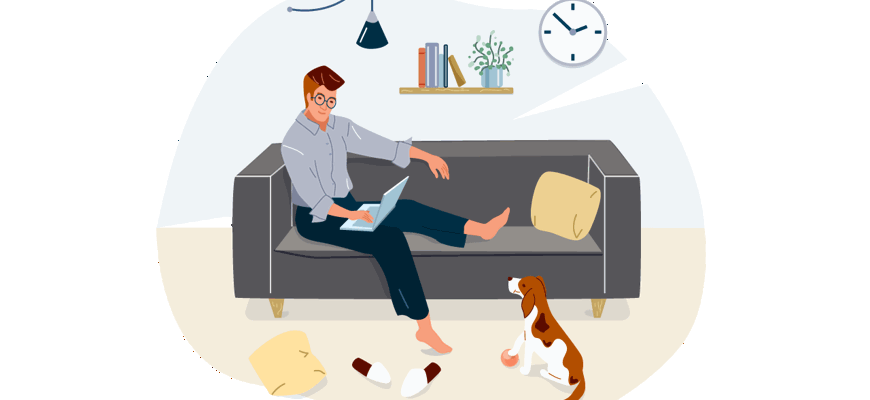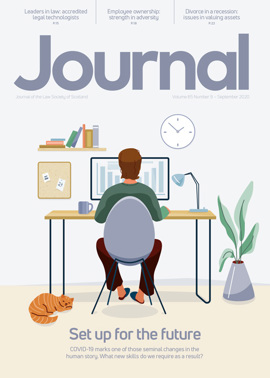Soft skills for a harder world

It's a challenge to write a piece like this without repeating a multitude of platitudes about the current situation. Every once in a while, something happens that changes the world in a way that wasn’t imagined and cannot be reversed. Recent examples include 9/11 and its effects on air travel, in particular security. Most of us now have probably forgotten the more relaxed travel of the past, before queues for scanners and baggage searches. Likewise, the Y2K bug pushed us from our Unix-based office computers to desktop PCs, and from there on to the cloud.
The list in many ways reflects human evolution: challenges, change and then adaptation to a new norm. COVID-19 has been another of those moments.
What is interesting is that none of them in themselves brought about changes in technology. They accelerated a change in mindset which encouraged people to adopt technologies already in existence. Security systems and PCs existed long before 9/11 and the millennium, in the same way that remote working has been growing since the 1980s when IBM let its first five employees work from home, and growing rapidly since the early 2000s. COVID-19 has, though, catapulted homeworking forward by at least a decade, and many are now attempting to catch up.
Few would argue that remote working is not here to stay and, in this piece, I’m going to cover four key areas that it impacts. Most will be things you are already aware of; however, I’d like to look a little further at some of the issues we as a profession are still dealing with.
Life online: our digital selves
A good friend of mine laughed when I told him about all the benefits of Zoom and Teams. He has been using such tools for 10 years or more, in growing his software business internationally. In that time he has developed a deep understanding of how to make an impact with clients he may never meet.
Most legal firms over recent months will have developed a basic understanding of good virtual meeting etiquette. A few will even have invested in essential items to enhance the experience (good lighting, cameras, and broadband for a start). Are we yet, however, comfortable with all the facilities these services offer? Have we invested in the “pro” version, and perhaps more importantly, in training all our staff in best practice? In the same way that our receptionist so often gives the first impression of our business, what first impression do we now give when meeting online? It takes only seconds to make a first impression, but it can take a long time to overcome wrong ones. What do new clients think when they first meet you or your firm online? Have you asked them? For those looking to make a real impact, perhaps have a look at www.mmhmm.app
As for our websites and social media presence, no one reading this will need to be persuaded of the power of the internet when it comes to clients choosing their preferred legal partner. Under lockdown we have all become conditioned to purchasing whatever we need, whenever we need it, online. Even when we have a preferred supplier, most will now at least price-check the competition before committing. But how many firms have a clear system and methodology for attracting new clients and, more importantly, for engaging with clients after they contact us, with follow-ups to ensure that we maximise the opportunity from each new enquiry?
From the many firms I speak to there is a clear conflict for fee earners between already high workloads and time to follow up on enquiries. That follow-up and engagement, though, are a process, and like most processes can be structured and ideally delegated or automated as in many other industries. In this digital age, any lack of follow-up is like leaving a large hole in your fishing net.
Remote working: problem or solution?
Things are seldom black or white, and remote working, I suspect, is potentially both. Most firms appear to have found few issues with staff working from home, often discovering that productivity has increased as a consequence. Several are already looking at downsizing their real world footprint, anticipating a reduced requirement for office space. Amongst additional benefits has been, for some, an almost instant evolution to a paperless office, the quest for many firms over the years. As one practitioner told me he has learned, one office-based person is able to scan all correspondence and forward it to those working remotely.
In conversations about staff working remotely the responses are mixed. Many who craved the flexibility now appear keen to return to a more defined work day. While some have grasped it fully, I suspect many firms will develop a blended approach. Likewise we have yet to see the full extent of issues around furlough and the tensions that will arise, as those returning and those who worked through lockdown come to terms with their respective lots.
Under furlough the staff working remotely will generally have been among the most experienced, familiar with the office systems and trusted to use them appropriately, so the practical issues appear to have been few. This will not always be the case and, particularly as new staff are introduced, it will be important to consider how they are integrated into an office’s culture and systems. Previously they would been around more experienced staff, listening to their style and tone and able to ask questions. Often our paralegals have been the first port of call, being easier to get hold of, and less embarrassing to ask than admitting any knowledge gaps to partners.
All the above can be addressed, with some thought. Many firms already have a WhatsApp group for teams to ask questions. Inviting new members of staff to client Zoom meetings might also help. As the coffee break catchups no longer exist, don’t forget to diarise reminders to check in with colleagues regularly, particularly when there is a proof or large transaction pending. For new members of staff, file reviews remain key. A practitioner reminded me recently that second year trainees are less of a worry, as by then you have a good grasp of their abilities. Qualified solicitors new to the firm can be more of a challenge, as you can’t assume their levels of ability.
Remember also that emails and other written communications for teaching/review purposes are, compared with real time conversations, slow and clumsy and prone to misunderstanding. Scheduling real time meetings for these purposes wherever possible remains essential.
Both practitioners and staff can, at times, find the technology challenging. While I very much prefer the commute to my home office, nothing compares with the speed and ease of use of my office computer with its access to printers, scanners etc. Likewise, Zoom and Teams meetings save a lot of travel time, but somehow leave me feeling more drained than a “normal” meeting would. Moving forward, and with a little investment, all of these should become easier as firms adopt better IT systems, perhaps encompassing a more blended solution, with days in and out of the office.
On the subject of blended working (which I believe will be the route most firms take), give some thought as to how that might work for you. Hotdesking does not come without its issues: people are territorial and can become very attached to “their” desk. Most high street offices are not set up to accommodate staff moving freely between desks, and it would seem an opportunity lost if blended working simply meant different desks lying empty depending on the day of the week. Are firms, though, prepared to deal with all the issues around clear desk policies to facilitate real hotdesking?
The caring profession
One of the great unspoken tragedies of lockdown has been the sharp rise in issues around mental health. As a profession we are not immune, and many I have spoken to over recent weeks have indicated that working with limited human interaction has left them feeling, at best, low at times. Further, for many firms experiencing high levels of demand for services but with staff still furloughed, much of the strain is being borne by principals and senior colleagues, which exacerbates the problem.
While we are indeed a caring profession, that care tends to focus outwards towards clients, whose needs are often placed before our own. No single answer exists, but there are perhaps a few things for each of us to consider:
- Work can by its nature become all-consuming. We all need time out, and we need it most when we believe we don’t have any time to take it. Whether it’s going for a walk, doing the garden or just chatting to a loved one about anything except work, take time every day just for you.
- Following from that, I was once given this wise advice: “At a certain stage in your career the last thing you need is additional income: what you need is to build in longevity.” Learn to say no, whether to clients or colleagues, when the only way to get something done is by you taking on yet another matter.
- Remember that remote working brings with it access to a huge range of resources. Whether it’s a referral and support network like HM Connect, or an outsourced cashroom, compliance or even sales and marketing, is there a solution out there that can help?
- Build a support network. Sometimes these might be networking groups, university colleagues or, for myself, a breakfast club of legal business owners that meets once a month. All can be ideal places to discuss general business issues and, as importantly, to hear that others have similar issues and challenges.
- Remember LawCare (www.lawcare.org.uk/information-and-support), and don’t be afraid to contact them.
Business owners and managers also need to be more aware than ever of the need to really listen to staff. A simple “How are you?” is no longer enough. Lack of person-to-person contact can mask a lot of personal issues with colleagues, and we need to remove any barriers around staff being able, openly and without fear, to discuss any fears, concerns or issues, particularly when working remotely. Firms are different, so no one size fits all, but a mixture of team and one-to-one meetings online is a minimum and, if blended working allows, regular face-to-face meetings where possible.
The trust equation (T = C+R+I/S)
I have, for many years, been fascinated by the impact we as solicitors have on our clients. They return to us again and again, sometimes with years in between and with little or no communication from us in the interim. The internet has been eroding that, as I touched on above, but generally only in relation to new purchasers of legal services or those whose expectations were not fully met the last time. When remote meetings become the norm rather than the exception, will there be an erosion of the solicitor/client relationship?
During lockdown many of us will have been transacting work for clients already known to us, and Zoom meetings are ideal in many ways for keeping in touch and progressing work. The relationship is already there and simply needs to be maintained. New clients may be more of a challenge, as the more subtle human interactions just aren’t there and it can be much harder to create a relationship and, more importantly, build trust by videoconference.
There are steps to building relationships and trust. Most of us do it automatically, but there is a formula for it which is worth considering for a moment. Generally trust is built by credibility, reliability and intimacy. Credibility is our reputation and expertise; it’s why we look to become accredited or seek awards or (with clients’ consent) publicise cases we have been involved with. Reliability is our ability to get the job done, and it’s why client testimonials and sites like Trust Pilot are so important. I know that I seldom purchase without checking the reviews. Intimacy is the personal touch, the ability to give an appropriate amount of information about yourself as a person. People buy people, I was always told, and being able to share a little about who you are helps.
Lastly, if you do all of these well, demonstrate where and when you can that your only interest is in the client. Don’t be afraid to give a little knowledge or to share useful information, even when you think there is little chance of securing the client. You will have built up real trust, and that still goes a very long way when clients look to make the final decision about who to instruct.
In conclusion
In case you hadn’t already realised, what we are experiencing is just a part of the cycle of business. These changes have been going on for ever and will continue to do so. Like every change, it brings threats and opportunities and there will be winners and losers. Our profession so far has proven itself, I believe, to be robust and more than up to the challenge. The question now is how each of us embraces the opportunities ahead and surmounts the challenges that they bring.
Regulars
Perspectives
Features
Briefings
- Civil court briefing: Lessons from a video proof
- Corporate briefing: Business support: going our own way
- IP briefing: China – a friendlier place for IP rights?
- Agriculture briefing: Was there a croft here?
- Scottish Solicitors' Discipline Tribunal
- Planning obligations: seeking better practice
- Construction briefing: Rough justice, smoother delivery







